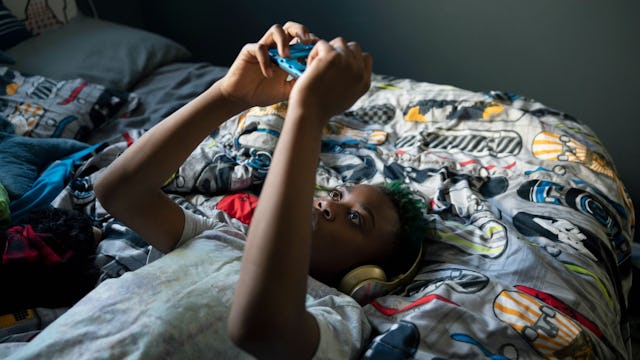I Love Parenting My Autistic Tween

It’s 5 AM, and my 11-year-old son is standing at my bedside, shaking me awake. He needs to tell me about something he learned in science class yesterday. Not related, but also very important, he wants to read me a section of the novel he is writing.
“Baby,” I say. “I need a minute. I’m really tired.”
“This is important, Mom!” He runs back out of the room, and I hear him preparing to write. He’s chattering to himself, his fingers drumming on the dining room table as his computer starts up.
I drag myself to the kitchen and see that he’s already emptied the dishwasher. Anxiety can be rough for kids on the spectrum, and to-do tasks are anxiety-provoking, so this is one less thing for him to worry about.
I make coffee and watch him tapping frantically at the keyboard, pausing to chirp and flutter his fingers, then diving back in to his chapter. He is writing a science fiction novel about a humanoid robot that becomes self-aware, who looks like all the other robots but believes that he is a real boy. A combination of Pinocchio and I, Robot, adding in an unconscious narrative of his own unusual neurology.
“They think I’m like the other robots,” he reads to me. “They don’t know I have feelings and ideas, that I learn and mimic what I see just to fool them. I want them to see me, but I’m too scared to show them who I really am. What if they don’t care? What if they lock me up?”
His writing pulls me back to years earlier, when I first started wondering about his behaviors and mannerisms.
“Thank you for helping us,” he said to the lady bagging our groceries one day. “You must be a good person, to choose a job that helps people. Not everyone decides to do that.”
“How old are you?” she asked.
“Three,” he said, and offered his hand to shake.
No doctor ever mentioned autism, not with his early speech and love of hugs, and he charmed everyone with his shrewd, literal observations of the world.
But his charisma turned to awkwardness as he got older, anxiety and mood dysregulation kicking in as he entered his elementary school years. Sensory issues escalated. Social challenges snowballed. Kids bullied him for being “weird,” and teachers misconstrued his unusual hand gestures, pressured speech, and misinterpretations of social cues.
He melted down, triggered by mysterious causes I struggled to pinpoint. He had few friends. Even with therapy and near-constant school meetings, it took years to get a diagnosis. And when we finally got one, it devastated me.
It’s hard to acknowledge the way I rejected my own child when I first saw him for who he was.
But having to fight for him in school and the larger world changed me. I grew angry as teachers and principals listed all the things that were wrong with him. Why didn’t they see what he was capable of? My own perspective shifted and refocused as doctors and behavioral therapists tried to train him to be more like the typical kids around him. I wondered why I was allowing others to train my child at all.
He stayed calm and productive when we supported him at home by reducing stimuli and avoiding overwhelming situations. He built Lego rocket ships with his sisters, helped his dad cook dinner, and took walks with me, discussing his plans and dreams.
We moved him to a school that didn’t tolerate bullying and celebrated the value of all learners. As his teachers learned about his needs, accommodating him with short breaks and a quiet space to work alone, his meltdowns at school reduced dramatically. After a year, he became a school ambassador and got straight A’s. He needed support, but also supported others, making friends through his efforts to include other kids who struggled along the margins.
It took time, far longer than it should have, for me to realize that this wasn’t about me or my expectations. It was about my son, about getting over my idea of what parenting was supposed to be and simply showing up and loving my kid. It’s hard to admit that I wept when I first heard a doctor say “autism,” to describe the shell-shocked, heartbroken mother I used to be. I lost sight of his deep belly laugh, his soft blonde hair, the way he cuddled close and asked me questions about space as he fell asleep.
My son transforms everyone he comes in contact with. The more I learn about him, and about autism itself, the less I want to change or “cure” him. In many ways, he is profoundly disabled. In other ways, he is extraordinary and independent. In all ways, he is funny, smart, and loving. The baby boy I was supposed to have, to raise, to hold close and adore.
I love parenting my autistic child.